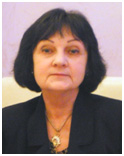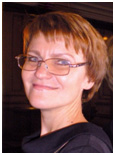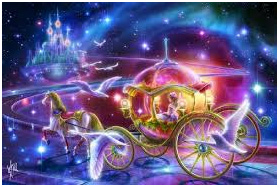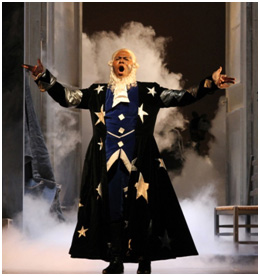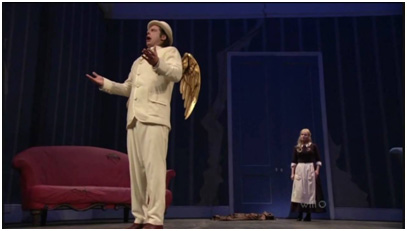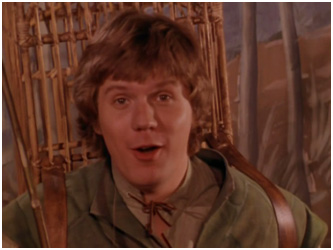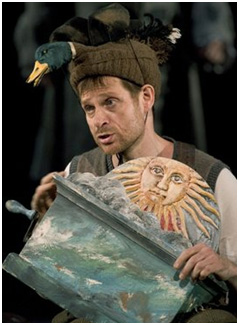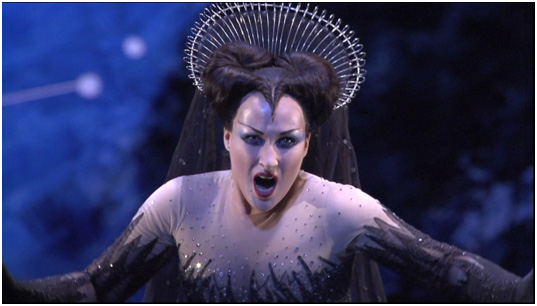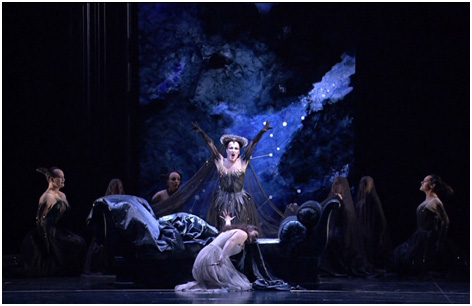Шапинская Е.Н., Добренкова О.П.
Диалоги в рождественскую ночь: о сказках, музыке, и не только...
Аннотация. В статье, написанной в форме диалога, представлены два взгляда на произведения классической культуры - оперы Россини «Золушка» и Моцарта «Волщебная флейта». Е. Шапинская, культуролог доктор философских наук, рассказывает о философском осмыслении этих произведений в различных рефлексивных парадигмах, в то время как О. Добренкова, дизайнер, выражает точку зрения любителя музыки, воспринимающего ее эмпатически. Оба произведения интересны тем, что могут восприниматься как сказочные истории, доступные и для детской аудитории, и как культурные тексты, имеющие глубокий культурно-философский смысл, то есть представляют собой образец постмодернистского "двойного кодирования".
Ключевые слова. Культура, искусство, нарратив, культурный код, эмпатия, рефлексия, культурный код, культурный капитал.
Действующие лица: Е.Ш. – культуролог, О.Д. – дизайнер
Е.Ш. Перед Рождеством и Новым годом хочется сказки, это волшебные дни, когда все вокруг приобретает таинственные очертания, а обычные предметы, как в Синей птице Метерлинка, преображаются и начинают вести свои беседы. Великий сказочник Толкиен говорил о необходимости сказок не только (и даже не столько) для детей, сколько для взрослых, поскольку они «предлагают, особым образом и в известной степени, такие ценности как Фантазия, Исцеление, Бегство, Утешение - все то, в чем дети, как правило, нуждаются менее взрослых» [1]. В рациональной жизни человека эпохи техногенной цивилизации, казалось бы, сказка уходит в область утерянного детства, смутных воспоминаний о слышанных когда-то давно сюжетах - но на самом деле все обстоит не так. Чем больше в нашу жизнь входят созданные при помощи последних достижений науки приборы и гаджеты, чем доступнее становится информация о самых разных событиях прошлого и настоящего, тем популярнее становятся сказки. Если мы посмотрим на самые успешные сюжеты, которые легли в основу продукции массовой культуры, став книгами, экранными историями, игрушками, компьютерными играми, мы увидим, какое большое место занимает в этой области сказка, начиная с диснеевских версий сказок братьев Гримм и заканчивая столь распространенными среди детей и тинэйджеров Гарри Поттером и вампирскими сагами.
О.Д. Все мы – великие сказочники, хочется нам того или нет. Мы рассказываем их себе перед сном, пугаем себя сказками, утешаемся ими, рассказываем свои сказки другим и очень хотим, чтобы в них поверили, как верим и мы сами. И всем нам хочется, очень хочется, чтобы прекрасная сказка хоть раз в жизни стала явью.
Е.Ш. Вот и мы сегодня обратимся к сказкам, но к сказкам музыкальным, потому что обе любим музыку, особенно оперу - а разве можно представить себе более волшебный мир, чем мир оперы! Нам хочется, чтобы вы все приняли участие в нашем диалоге - если вы любите оперу так, как мы - ждем ваших дополнений, возражений... Если нет - нам очень хочется, чтобы вы ее полюбили: это прекрасный мир, где сливаются музыка и слово, где человеческие чувства ярки и сильны, где реальность становится сказкой благодаря великой силе музыки. Понимать такие сказки в наше время сложно, и для раскрытия смыслов нужен подготовленный зритель/слушатель, обладающий «культурным капиталом». Замечательный французский социолог ХХ века, разработавший свой подход к социологии искусства, Пьер Бурдье писал в своей работе «Различие» [2], что культурный код автора должен совпадать с культурным кодом воспринимающего. Когда эти специфические условия невозможны, возникает непонимание. Иллюзия непосредственного понимания ведет к иллюзорному пониманию, основанному на ошибочном коде. Согласно Бурдье, невозможно восприятие, в котором не присутствует бессознательный код. Очень важно отказаться от мифа о свежем взгляде, который считается добродетелью, дарованной «безыскусностью» и «невинностью». Таким образом, для того, чтобы в полной мере насладиться оперой, надо обладать знаниями в области истории музыки, истории культуры, понимать основы музыкального языка, на котором строятся музыкальные произведения. Но значит ли это, что опера доступна только узкому кругу получивших основы музыкального образования людей? Как в таком случае объяснить то, что в наши дни, когда повсюду торжествует массовая культура, опера обретает новую жизнь на многочисленных фестивалях и на экранах кинотеатров, ведущих он-лайн трансляции из крупнейших оперных театров?
О.Д. Не могу согласиться с этим вполне, поскольку не обладаю (как мне кажется) ни одной из перечисленных «добродетелей». Наличие начального музыкального образования вовсе не означает, что я умею понимать «основы музыкального языка» или «обладаю знаниями в области истории музыки». Возможно, что-то присутствует, но оно настолько неосознанно, что я вполне могу это игнорировать, когда речь заходит о том, как я слушаю и воспринимаю ту или иную оперу.
В опере есть то таинственное, словами неопределимое, что может найти путь к сердцу практически любого человека, просто эти тропочки так неуловимы, неосознанны и тонки, что, наверное, не каждому повезло. Мне вот «повезло» совсем недавно и почти случайно, за что надо, наверное, поблагодарить кого-то, кто решил, что мне без этого не жить. А я не стала сопротивляться - и вот результат! Огромный, невыразимо прекрасный мир передо мной, а я ведь только в самом начале пути!
Е.Ш. Несомненно, искусство доступно не только рациональному восприятию, основанному на знаниях и рефлексии, но и непосредственному эмпатическому погружению в мир его образов. Особенно это применимо к музыке, где чувственный элемент выражен сильнее, чем в других видах искусства. Оперный спектакль представляет собой сочетание различных способов репрезентации, как вербальных, так и невербальных. Несмотря на важность чисто музыкальной составляющей, в опере всегда присутствует нарративный элемент в форме либретто, часто связанного с литературным источником. Эмотивная составляющая нарратива усилена музыкой, которая, хотя и не является вербальным высказыванием, но составляет важнейшую часть семиотического кода. Конечно, либретто чаше всего служит лишь основой для демонстрации вокального мастерства. Но в то же время во многих операх, (в частности, у Моцарта), нарративная линия поддерживается речитативами. Человеческие отношения, составляющие важную часть любого оперного нарратива, выражены очень драматично, поскольку музыкальный элемент приходит на помощь вербальному. Кроме того, музыка эротична по своей сути, что усиливает все нюансы противоречивых и динамичных силовых полей в любовных отношениях, без которых немыслима почти никакая опера. Этот изоморфизм музыки и сексуального опыта подчеркивает американская исследовательница С. МакКлэри, которая считает, что большинство классической музыки «настроено» на доминирующий «мужской» слух. «Воздействие музыки часто тесно связано с метафорической симуляцей сексуальной активности… Сама тональность – с ее процессом возбуждения ожиданий и последующей задержкой обещанного выполнения до высшей точки – является в период с 1600 до 1900 года главным музыкальным средством возбуждения и направления желания. Даже без текстов и программ тональные композиции, начиная с органных фуг Баха и до симфоний Брамса приводят в движение потоки либидинальной энергии, которые задерживаются или прорываются» [3]. Конечно, оперный дискурс – понятие весьма условное, как и понятие «язык музыки». Как отмечает британский эстетик Г. Грэхем, «многие значительные исследователи музыки приписывали ей как способность к репрезентации, так и свойства языка» [4]. В опере этот процесс конкретизируется с помощью вербального элемента и сюжета, для которого любовь, власть, столкновение принуждения и свободы столь типичны. Тема любви как отношения власти, доведенная до ее рокового завершения, является весьма востребованной в опере и может многое нам рассказать о понимании этого отношения в разные эпохи. Кроме того, оперная сцена, будучи пространством активных экспериментов в области переосмысления сюжета (в особенности в современной «режопере»), помогает лучше видеть тенденции современной культуры по отношению к тем человеческим отношениям и ценностям, которые часто объявляются устаревшими, переосмысливаются, часто искажаются.[5] То, что происходит на современной оперной сцене, далеко не однозначно по отношению к классическому наследию, вечным ценностям искусства. Как бы мы ни относились к экспериментам «режоперы», стремление понять ценность произведений прошлого для сегодняшнего дня вполне естественна, а удачна или неудачна интерпретации старого сюжета в новом духе, зависит от многих обстоятельств, среди которых талант режиссера и адекватность исполнителей занимают не последнее место. Сказки всегда были любимым предметом для создания новых и новых версий - сказочные персонажи не обусловлены жесткими рамками историзма, сказка - это то, что могло произойти в любое время и в любом месте, поэтому, на первый взгляд, сказка с ее архетипическими образами и нарративными моделями легко поддается модернизации. Но здесь таится опасность выйти за пределы «времени композитора», стилевого единства всех компонентов произведения, которые, будучи перенесенными в иной стилевой контекст, могут казаться абсурдными. Примеров такого рода «осовременивания» классики очень много, каждый может сам вспомнить ту или иную постановку. наполненную реалиями наших дней, которые совершенно не увязываются ни с музыкальной стилистикой, ни с либретто. Постановка произведения иной эпохи, в том числе и основанного на сказочном сюжете, требует очень тонкого понимания не только формы, но и эмоции, и способа ее выражения, характерного для того или иного времени. Если удается найти точку соединения темпорального и вечного, прошлого и сегодняшнего, тогда возможно создание шедевра. В противоположном случае постмодернистская игра со временем может стать разрушительной как для произведения, так и для исполнителей, и для зрителей/слушателей Сегодня мы обратимся к двум операм-сказкам, которые мы знаем в многочисленных вариантах, любим и хотим поделиться этой любовью как рождественским подарком со всеми нашими друзьями. Мы расскажем, как воспринимает оперу культуролог, для которого анализ культурных текстов - профессия, и человек, также близкий к искусству, но в совершенно другой сфере, более близкой к визуальной культуре, непосредственно производящий визуальные образы. Наш диалог - это не спор, это две точки зрения на оперу и на сказку, которые мы обе любим, но воспринимаем по-разному. Речь пойдет о «Золушке» Россини и «Волшебной флейте» Моцарта. Мы отобрали те спектакли, которые кажутся нам наиболее удачными, которые мы видели на сцене и в записи, которые - поскольку говорить об искусстве невозможно без определенной субъективности - привлекают нас эмоционально, создавая необъяснимое очарование, которые мы хотим передать вам в эти предновогодние дни.
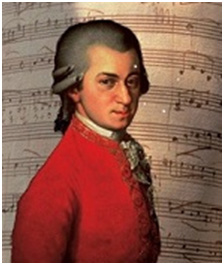
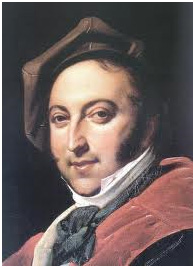
О.Д. Принц… Принцесса… Кто из дам любого возраста не мечтал о прекрасном принце (и не воображал бы себя, хотя бы разочек, прекрасной принцессой). Какая магия заключена именно в этих словах, когда простое их упоминание уже намекает на начало сказки? Почему они так хорошо сочетаются со словами «прекрасный», «сказочный», «необыкновенный», «волшебный»? Почему я сразу начинаю ждать чудес, когда мне попадается на глаза история, в которой действующим лицом является принц? Нет, я конечно, понимаю, что русская традиция (и не только) вполне может рассматривать в качестве главного героя какого-нибудь Иванушку-дурачка или царевича-королевича… Но для меня с принцем (как персонажем) не сравнится никто! Потому что принц! И все!
Это так, даже если мы имеем дело с такой, совсем даже и не сказочной, историей как сюжет оперы «La Cenerentola». Можно я буду так это называть? Потому что Золушка – это не совсем то, потому что «La Cenerentola» (когда научишься произносить, что обычно происходит только после определенной тренировки) - это уже почти россиниевский серебристый перезвон.
Итак, «La Cenerentola». Сказка. А ведь нет в ней ничего сказочного! Сказочное везение – да, а сказочного антуража нет. Есть история о том, как доброй милой девушке вначале было совсем тяжко в жизни, а потом повезло. Повезло, как в сказке! Причем истоки этого везения почему-то выведены за рамки этой истории. Потому что непонятно, почему принц должен, вынужден жениться именно сейчас («…жестокий приказ отца… жениться без любви…»), почему учитель принца ищет невесту именно в доме разорившегося барона Маньифико, и сколько домов обошел он в поисках подходящей кандидатуры. Если задуматься – вопросов возникает великое множество. И ответов на них у меня нет. Впрочем, возможно, я не искала их в достаточной степени усердно.
А вот главный вопрос так и открыт, хотя именно этот сюжетный ход делает эту историю сказкой для всех: для детей и взрослых, для дам любого возраста, особенно тех, кто уже не верит в прекрасного принца! Почему же, интересно мне знать, Россини отказался от тыквы-кареты, мышей-лошадей, крысы-кучера? И, наконец, от доброй феи?
Е.Ш. В «Золушке» Россини изменяет сюжет. На место доброй феи приходит новая фигура - наставник принца, философ Алидоро. Кто он такой? Зачем была нужна эта трансформация?
О.Д. Да, добрая фея сказочным образом превращается в философа - учителя принца Алидоро. Хотите верьте – хотите нет, но он-то и предстает самым сказочным персонажем. В каких-то постановках, как, скажем, в барселонском «Лисеу», он просто одет в костюм мага со всеми атрибутами: плащ со звездами, посох, остроконечная высокая шляпа; в каких-то, как в Метрополитен-опера, предстает с ангельскими крыльями, что, учитывая внешность певца, наводит вовсе не на «ангельские» ассоциации; где-то он лишен этих волшебных примет совершенно.
Но я сейчас вовсе не об этом. Потому что есть постановка, на премьере которой я была в Вене в январе этого года. Режиссер Свен-Эрик Бехтольф наделил Алидоро всеми чертами сказочного персонажа, что на фоне прочей обыденности и упрощенности декораций, костюмов и внешности остальных героев, не оставляет никаких сомнений, кто же главный герой оперы «La Cenerentola».
И вот тут, даже если бы не хотела (а я очень хочу!) сказать о том, кто же исполнял эту роль. Ильдебрандо Д’Арканджело умеет стать главным героем, даже когда, возможно, это и не предусмотрено сюжетом и не задумывалось постановщиками. Потому что… Ну, вот такой он! Нельзя его не заметить!
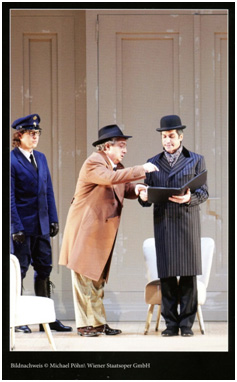
Когда режиссер учитывает это и делает ставку на его внешние и актерские данные – получается именно то, что я увидела. Алидоро стал подлинным волшебником, магом, которому не просто захотелось направить принца «на тот путь, где он сможет найти правильную женщину», как сказал сам Ильдебрандо Д’Арканджело [6], но и сделать это легко и красиво. У меня возникают устойчивые параллели с «Обыкновенным чудом» Шварца. Помните: «Таким уж я на свет уродился. Не могу не затевать, дорогая моя, милая моя. Мне захотелось поговорить с тобой о любви. Но я волшебник. И я взял и собрал людей и перетасовал их, и все они стали жить так, чтобы ты смеялась и плакала… Одни, правда, работали лучше, другие хуже, но я уже успел привыкнуть к ним. Не зачеркивать же! Не слова – люди». Алидоро (а с его помощью и Бехтольф) собрал всех этих людей, чтобы поговорить о любви со всеми нами, ему «захотелось пошалить», захотелось простыми словами поведать о высоком и прекрасном.
И, могу сказать, это удалось! Я забыла принца, забыла Анджелину-Золушку, забавного Дандини, и глупого смешного Дона Маньифико. Они стали марионетками в руках чародея – Ильдебрандо Д’Арканджело. Он «творил грозу», чтобы второй раз привести принца в дом, где того ждет счастье, он получал букет из рук портрета Золушкиной матери, мановением руки «выстраивал» героев, критически оценивая результат. И при этом в нем не было ни вычурности, ни напыщенности, он был игрив, дурашлив, забавен, когда ситуация позволяла. Он развлекался!
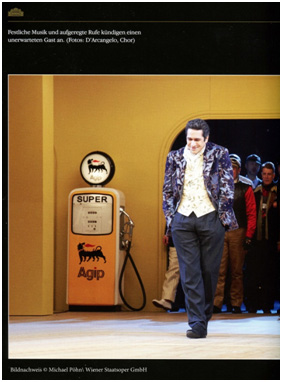
Но куда девалось все этого, когда было не до шуток. Ария Алидоро Là del ciel nell’arcano profondo – призыв не отчаиваться, потому что Всевышний все видит, все знает и не оставит невинную девушку в беде. Когда Ильдебрандо Д’Арканджело пел это, мне показалось, что он поет для меня, судя по тишине, царившей вокруг – это чувствовали все в зале. Я не могу описать словами, как он поет, я не знаю таких слов. Я могу только сказать – это прекрасно! Это находит отклик в самой глубине души. И я бы очень хотела сказать спасибо Россини, который добавил эту арию позже, в 1820 году, потому что без нее опера не обрела бы того, что делает ее не просто сказкой.
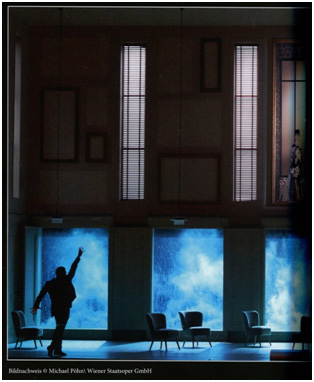
Е.Ш. Да, могу подтвердить, Алидоро в прекрасном исполнении Ильдебрандо Д'Арканджело действительно стал героем этой «Золушки» - он присутствовал во всех сценах, играя роль дирижера, которому подвластны не только человеческие судьбы, но и природные явления. Практически идеальное совпадение образа и исполнителя придали новое смысловое наполнение архетипичному сюжету. «Бас-баритон Алидоро должен иметь бархатный тембр, чтобы сделать мудрую философичность этого персонажа вокально убедительной - в конце концов именно он, в разных обличьях, ведет Анжелину через оперу. Таким образом, он становится похож на рассказчика в "Волшебной флейте"» [7].
«Подобно распорядителю игры в разных обличьях Алидоро определял ход действия» [8] - так можно сформулировать суть этого персонажа. В такой трактовке образа Алидоро, по сравнению с которым Принц кажется маловыразительной оперной условностью, мне видится общая тенденция культуры постмодернизма, которая рассеяла жесткость традиционных бинаризмов, вынесла на периферию многие культурные тексты, артефакты, формы из центра на периферию, дала возможность обрести Голос персонажам, которым изначально было отведено второстепенное место. В этом смысле перемещение смыслового центра «Золушки» на учителя-мудреца Алидоро является примером постмодернистской деконструкции старой сказки. Но есть еще один момент, который привлек меня в этом спектакле, немного условном, немного политизированном, немного ироничном - судьбы героев решают вовсе не они сами и их воля, ими дирижирует добрый волшебник, который понимает всю суетность, слабость, тщеславие запутавшихся в интригах персонажей и столь же блуждающих в темноте Принца и Золушку. Без вмешательства посторонней силы судьбы людей сплетаются в клубок противоречий. так блестяще отраженный в сложных ансамблях, столь любимых Россини - люди ничего не могут решить сами, и хорошо, если направляющая их сила несет добро, как это показано в венской Золушке через образ Алидоро.
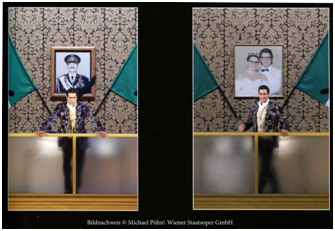
Е.Ш. Обратимся к еще одной оперной сказке – «Волшебной флейте» Моцарта. Для меня эта опера - загадка, на которую можно по-разному ответить. Часто «Флейту» ставят как детскую сказку, но, с другой стороны, в эпоху «фурора экспериментации» на (пост)современной сцене существуют самые разные модернизированные версии оперы. Мы выбрали спектакль, который долго шел на сцене лондонского Ковент Гардена, поставленный режиссером Д.МакВикаром, в котором, на наш взгляд, наиболее удачно сочетается сказочный и философский аспекты этой оперы, в которой Моцарт наиболее ясно, даже декларативно, выразил свои взгляды на многие жизненные проблемы, ничуть не решенные и в наше время, но выраженные с точки зрения человека своей эпохи, конца XVIII века, когда радикально менялись отношения в обществе, когда существующие в течение веков властные структуры теряли почву под ногами. В сказочной форме «Волшебной флейты» композитор мог сказать многое, что только намеком проскальзывало в других произведениях.
О.Д. Уж не знаю, почему, но я никогда не воспринимала "Флейту" как сказку и, когда читала о детском спектакле "Волшебная флейта", мне хотелось пожать плечами – не понимаю! С одной стороны, в ней много того, что относится к непременному сказочному антуражу: принц, красавица в руках злого чародея, волшебные атрибуты – флейта, колокольчики… Но все это вызывает ощущение какой-то чрезмерности, так что перестает быть просто сказкой, и в ней поневоле ищешь скрытый смысл, пытаясь увязать все это между собой. Не в этом ли причина того, что "Флейта" препарировалась исследователями за эти столетия неоднократно, так что сейчас я уже не могу воспринимать ее просто сказкой, для меня она предстает некоей притчей, насыщенной фантастически-мистическими элементами. Причем, разбираться в этом можно до бесконечности, потому что прямой ответ на вопросы в самом тексте найти практически невозможно. Впрочем, не могу сказать, что я старалась их найти с преувеличенным усердием. Вначале я слушала... Долго и с большим интересом. Моцарт же! Когда слушаешь – все логично, потом начинаешь ухватывать отдельные слова, потом пытаешься понять, о чем же все-таки поют… Я пришла к выводу – не стоит мне в это вникать! Не сейчас, потому что нельзя вот так сразу понять, о чем же это хотел нам поведать Моцарт. А может не нам, а может и не хотел вовсе…
Е.Ш. При постановке «Флейты» сегодня поддерживать баланс между сказочным сюжетом, подлежащей философией и музыкальной стилистикой, находящейся между фольклорной традицией Зингшпиля и утонченной рокайльной изысканностью и усложненностью, - далеко не простая, почти невыполнимая задача, которую Мак Викар решает с иронией и тонкостью.
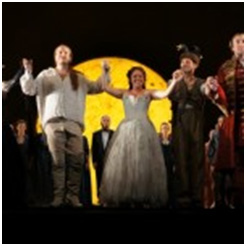
«МакВикар ищет, отвлекается, дразнит... Спектакль начинается иронической отсылкой к масонской мистике дверей, странных геометрических форм - призм и конусов. Цвета поданы как крупные мазки - голубые, серые, желтые, красные для Зарастро и иногда для весьма необычного Моностазоса - он вовсе не похож на Калибана, скорее это беглец из какого-то дивертисмента периода Людовика XIII и Люлли... В дни Шиканедера(или Генри Бишопа в Лондоне) увлекались различными сценическими устройствами. ... Похожий на удава дракон - весьма смелое развлечение, так же как и цапля, которая танцует как марионетка на веревочках в сцене появления Папагено,... возникающего подобно кроту из норы и взаимодействут с ним во время его песенки» [9]. Итак - мы снова видим, что не Принц - главный персонаж, почему же интерес философа Кьеркегора пробудил не волшебник Зарастро и не Принц, а странная фигура «человека из леса» - птицелова Папагено?
О.Д. На всем этом сказочном фоне возникает какая-то, абсолютно чужеродная фигура – Папагено. А это кто, простите? Человек? Нет? Откуда он такой взялся – сплошное «дитя природы», птицелов, который не имеет в жизни каких-то особенных целей, живет сегодняшним днем, как птицы, которых он ловит и приносит Царице ночи, чем, собственно, и живет.
Е.Ш. Замечательный анализ «Волшебной флейты» дан С. Кьеркегором в его работе «Непосредственные стадии эротического, или музыкально-эротическое несущественное введение» [10]. Хотя этот работа в основном посвящена анализу оперы Моцарта «Дон Жуан», датский философ обращается и к «Волшебной флейте». Кьеркегор говорит о «немузыкальности» этой оперы, имея в виду «раздельность» музыкальной и вербальной ткани, которые сами по себе разные субстанции для восприятия. «Музыка - гораздо более чувственное средство, чем речь, - пишет Кьеркегор, поскольку она делает гораздо больший упор на чувственный звук, чем это делает язык» [11]. В «Волшебной флейте», таким образом, сочетаются чувственный и не-чувственный элементы, поскольку диалогов в ней не меньше, чем музыкального материала, как это и подобает Singspiel, то есть драматическому произведению с пением.
Кьеркегор рассматривает «Волшебную флейту» не как выражение масонских взглядов Моцарта и Шиканедера (что часто выделяется как ее основной аспект), не как гимн эзотерическому знанию, а с точки зрения своей концепции произведений Моцарта («Свадьба Фигаро», «Волшебная флейта», «Дон Жуан») - как пространства реализации различных стадий эротического. Если первая стадия, связанная с «субстанциональным томлением» воплощена в образе Керубино, то вторая - «желание, направленное к открытиям» - Папагено из «Волшебной флейты». «Эта страсть к открытиям является пульсирующей жизнью желания, его бодростью. В своих поисках желание не находит собственного предмета, но находит зато многообразие, в котором он снова ищет предмет, что ему хотелось обнаружить. Так желание пробуждено, но оно еще нет определено как желание [12]». Соответственно, музыка Моцарта в тех оперы, где появляется Папагено «...весело щебечет, брызжет жизнью. бурлит жизнью» [13]. Внимание, которое неизменно привлекает этот персонаж, связано с тем, что вся его музыкальная составляющая «представляет собой абсолютно адекватное выражение жизни Папагено, - вся эта жизнь - сплошное щебетание: всегда беззаботный, он щебечет без устали в своей праздности, он счастлив и доволен, поскольку это и есть содержание его жизни, он счастлив в своей работе и счастлив в своей песне» [14]. Во многом привлекательность музыкальной составляющей Папагено была обусловлена тем, что либреттист «Волшебной флейты» Э. Шиканедер сам участвовал в постановке в роли Папагено, а «постановка ее в фантастических египетских декорациях...потрясли зрителей намного больше, чем сама музыка» [15].
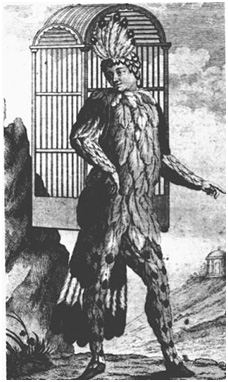
Конечно, такой образ должен быть передан, прежде всего, музыкально, и здесь мне бы хотелось обратиться к интерпретации «Волшебной флейты», сделанной еще в середине прошлого века, в которой, как мне кажется, этот образ музыкально воплощен именно с позиций соответствия образа человека природному началу, которое является его стихией и сообщает ему формы выразительности. Я имею в виду запись 1954 г. (дирижер Ференц Фричаи), где Папагено в исполнении Д. Фишер-Дискау сочетает чисто человеческие слабости с природной счастливой диспозицией. В дуэте с Папагеной вокал обретает черты истинного «щебетанья», и эта комически-трогательная пара предстает в образе триумфа природного начала торжества жизни.
фильме И. Бергмана "Волшебная флейта", великолепной экранизации этой сказочно-философской истории, перед зрителем предстает приближенный к повседневности, демифологизированный образ вполне земного молодого человека, лишенного мифически-живописных черт, так часто сопровождающих этот странный образ в виде экзотических костюмов и головных уборов.
В спектакле МакВикара Папагено также лишен какой-либо экзотики трогателен и сознательно "приземлен". Оказавшись среди сильных мира сего, он «действительно …сбит с толку миром людей, чувствуя себя гораздо счастливее среди птиц"» [16]. Саймон Кинлисайд, который исполнял роль Папагено на протяжении многих лет, в спектакле МакВикара «делает скептическую робость» своего персонажа «... одновременно трогательной и фарсовой» [17].
О.Д. Среди нагромождения персонажей, чья сказочно-мифическая сущность подчеркнута костюмами, гримом, париками, причем, в разной степени: от умеренной, как у принца с Паминой, до гипертрофированно-гротескной у Царицы ночи и Моностатоса, вдруг возникает Нечто, обшарпанно-задрипанное (простите!) И почему же, скажите на милость, это существо приковывает взгляд, не отпускает и не дает мне расслабиться?
Я ловлю себя на том, что во время излияний Тамино и Памины (особенно Тамино), жду, когда же появится Папагено, потому что мне интересно, как он себя поведет, что он сделает, и как повлияет на ход событий. Нельзя назвать его поведение судьбоносным, нельзя сказать, что без него принц не справился бы… Но я, лично, без него точно не обошлась бы в этой странной сказке. Почему-то он вызывает у меня главный эпитет: «Какой милый!» На него смотришь с улыбкой, ему радуешься, за ним наблюдаешь с интересом, полностью забыв о прочих, наверное, главных героях.
Что это – личность Саймона Кинлисайда наполнила таким смыслом образ Папагено, таков был замысел режиссера, или так вот и случилось чудо преображения, о котором даже и не задумывался никто? Терпеть не могу это слово – харизма, но другого подобрать не могу никак – да, харизма певца и актера, без которой никакой режиссер не справился бы с подобной задачей.
Да, в фильме Бергмана Папагено тоже мил. Но он просто мил, обаятелен – это его внешность, поведение, открытая улыбка и черты лица. Там нет этого чуда, когда он становится центром постановки, там он органичен, вписывается вместе со своей Папагеной в общую картину, вполне сказочную, вполне вдумчиво-символичную, но без чрезмерных внешних акцентов.
Е.Ш. Сам исполнитель так определяет суть своего героя: «...Папагено полностью соответсвует классическому комическому типажу... К тому же перед нами типичный шекспировский шут, который высказывает истину, иногда в одном предложении, даже сам не догадываясь об этом, и этот делает его чудесным...». В Папагено сочетается «заурядность и неудачи человека, который научился принимать свое положение как данность и вполне доволен этим в отсутствии чего-то другого. Хотя он все время говорит. что ему хотелось бы иметь подругу, у него есть свои способы получать удовольствие от жизни». Важные вопросы, которые Моцарт задает исполнителям и слушателям в «Волшебной флейте» касаются того, что такое жизнь и какой она должна быть, о том, что можно и что нельзя изменить. И один из ключевых моментов в этом смысле связан с образом Папагено - когда ему говорят о его непригодности для круга избранных, он отвечает: «Дайте мне стакан вина». Потом, после паузы он говорит: «Я хочу… я хочу... я не знаю, чего я хочу». Откуда это сомнение, если он постоянно повторяет, что хочет женщину? «Я считаю, - размышляет Саймон Кинлисайд, - что здесь Моцарт задает вопрос публике: Что вы хотите от этой жизни? - и сразу же Моцарт создает короткую мелодию для колокольчиков, состоящую всего из 10 нот... Я подумал о другой мелодии, тоже состоящей из 10 нот, которая появилась 4 месяца спустя - (начало «Марсельезы»). Почему человек, который мог написать все что угодно в этом мире, выбрал это сходство? - только для того, чтобы сказать: То, что вам нужно, это свобода. Свобода быть теми, кто вы есть... не следовать социальным нормам» [18].
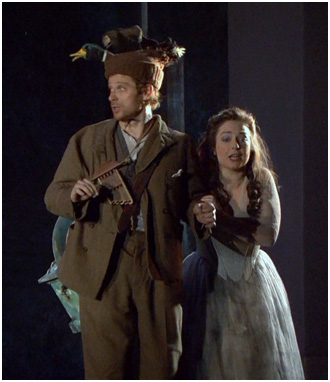
Действительно, вопрос свободы, как и другие важнейшие для человеческого существования проблемы, так или иначе затронуты в этой опере, которую часто называют «масонской». Но кроме отсылки к символике столь распространенного во времена Моцарта сообщества «вольных каменщиков» в этом произведении поднимаются вопросы этические, социальные, экзистенциальные. «У оперы есть тревожная сторона. Ее ценности - это ценности белые, маскулинные и элитарные. Моностасос изображен как зловещий персонаж, потому что он черный. Кроме Памины, все женщины унижены. Муж и жена, как нам говорят, достигают божественности, но эта божественность - удел немногих. Тамино и Памина, оба аристократы, достигают ее в духовно организованном сообществе Зарастро. Пролетария Папагено, однако, посылают обратно для производства потомства во внешний мир» [19].
Одной из важных тем оперы являются отношения мужчины и женщины с точки зрения господства/подчинения, которые выражены через истории вражды царицы Ночи и Зарастро, любви Памины и Тамино, поисками Папагено своей Папагены. Моцарта часто упрекают в мизогинизме, основываясь, в основном, на темной и деструктивной стороне Царицы ночи и ее царства. В спектакле МакВикара роль Царицы ночи исполняет Диана Дамрау, прекрасная, несмотря на нарочитую мрачность ее облика.
О.Д. Царица Ночи и три ее Дамы в спектакле представлены просто демонически: от париков и платьев до ярко выраженной мимики и жестикуляции Дианы Дамрау.
Люблю я ее, поэтому никак не могу примириться с ее «низвержением», поэтому и начинаю искать ей оправдания. Ведь и правда, дочь у нее отняли, хоть и из самых лучших побуждений, впрочем, тут все туманно, даже чересчур… Но ведь как же быть с полным исчезновением ночи и абсолютной власти света? Я как-то не могу с этим примириться и надеюсь в глубине души, что Царица все же одумается, помирится с Зарастро, и все пойдет своим чередом, потому что отдыхать и спать, простите, надо всем! А когда это и делать, как не ночью?
Е.Ш. Царица ночи прочитывается сегодня, несомненно, по-другому, чем во времена Моцарта. Претензия женщины на доминантную позицию уже не воспринимается как вызов устоям общества, поэтому эта фигура - скорее выражение маскулинной настойчивости на своем превосходстве, уже обреченном всем ходом развития культуры.
Итак, "Волшебная флейта", несомненно, содержит множественные смыслы, важные и для эпохи ее создания, и для последующих периодов развития искусства, дополняющих первоначальные идеи Моцарта и Шиканедера новыми, создающими пространство интертекстуальности, в которм и воспринимаются сегодня тексты культуры прошлого. «Как мы, в начале ХХ1 века, должны воспринимать "Волшебную флейту"? Притча Моцарта, с его поисками истины, просвещения и ненасилия, давно считается великим манифестом гуманизма, и слышать ее в темные времена - это сознавать, что мы предаем содержащиеся в ней прозрения» [20].
Мы обсудили важные вопросы, поставленные в великих произведениях прошлого, которые можно отнести к жанру музыкальной сказки. Мы по-разному относимся к музыке, к опере в частности - для меня эта важная часть художественной культуры, которая живет в традиционных и и новаторских интерпретациях, которая делает жизнь человека прекраснее, независимо от того, где происходит встреча с оперой - в театральном зале. на площадке фестиваля или на экране. Чтобы понять это прекрасное искусство, надо знать культурный контекст времени появления оперы, стилистические особенности искусства той или иной эпохи и, конечно, музыкальную ткань произведения. Тогда музыка раскроет свои тайны и будет воспринята нами как часть эмоциональной жизни - ведь она, как говорил Стендаль, «может изобразить самые преходящие оттенки чувства, такие оттенки, которых не уловил бы величайший из писателей» [21]. Для Ольги музыка - это прежде всего эмоция, непосредственное восприятие, эмпатия, это то, что делает нашу жизнь прекраснее, если мы готовы пойти навстречу музыке, вживаться в нее, сопереживать ей и ее героям. А сказка - всегда желанна, и детям и взрослым, особенно в то время Рождества и Нового года, когда всем хочется чуда, сказки, музыки и любви!
ПРИМЕЧАНИЯ
[1] Толкин Дж.Р. Сказки волшебной страны. М.: АСТ, 2010. С.370.
[2] См.: Bourdieu, Р. La Distinction. Critique sociale du jugement. Paris: Minuit, 1979 (Бурдье П. Различение: социальная критика суждения // Западная экономическая социология: Хрестоматия современной классики. М.: РОССПЭН, 2004).
[3] McClary S. Feminine Endings: Music, Gender and Sexuality. Minneapolis: University of Minnesota Press, 1991. P.12-13.
[4] Graham G. Philosophy of the Arts. An Introduction to Aesthetics. London-N.Y.: Routledge, 1997. P. 85.
[5] См. Шапинская Е.Н. Опера в контексте посткультуры: игры с классикой и конфликт интерпретаций // Культура и искусство, №3(15), 2013.
[7] Erich Seitter "Roles in La Cenerentola" // Wiener Staatsoper – Season 2012/2013 – Director Dominique Meyer, Gioachino Rossini, La Cenerentola. Programme concept and general editor: Andreas Lang, Oliver Lang.
[8] Ludwig Ch. "We had so much fun" // Wiener Staatsoper – Season 2012/2013 – Director Dominique Meyer, Gioachino Rossini, La Cenerentola. Programme concept and general editor: Andreas Lang, Oliver Lang.
[10] Кьеркегор С. Непосредственные стадии эротического // Кьеркегор С. Или — или. Фрагмент из жизни: В 2 ч. Спб.: РХГА, 2011. С 97.
[11] Там же.
[12] Там же.
[13] Там же.
[14] Там же.
[15] Брион М. Жизнь Вены во времена Моцарта и Шуберта. М.: Молодая гвардия, 2009. С.126.
[17] Rupert Christiansen for The Telegraph, 27 January 2003
[19] Tim Ashley, The Guardian, 27 January 27, 2003.
[20] Там же.
[21] Стендаль А.М.Б. Жизнеописания Гайдна, Моцарта и Метастазио. Жизнь Россини. М.: Музыка, 1987. С.465.
Фотографии:
Wiener Staatsoper – Spielzeit 2012/2013 – Director Dominique Meyer, Gioachino Rossini, La Cenerentola. Redaktion Andreas Lang, Oliver Lang. Bildnachweis © Michael Pöhn / Wiener Staatsoper GmbH
Музыкальные фрагменты, которые иллюстрируют содержание статьи, можно найти здесь:
1. Джойс ДиДонато (Анджелина) и Хуан Диего Флорес (Дон Рамиро) в постановке “La Cenerentola” Gran Teatre del Liceu 2009
© Шапинская Е.Н., Добренкова О. 2014
Статья поступила в редакцию 5 ноября 2013 г.
Шапинская Екатерина Николаевна
доктор философских наук, профессор,
начальник Отдела образования в сфере культуры
Российского НИИ культурного и природного
наследия им Д.С. Лихачева.
Добренкова Ольга Парфеновна
главный конструктор фирмы «Аэродинамика»


